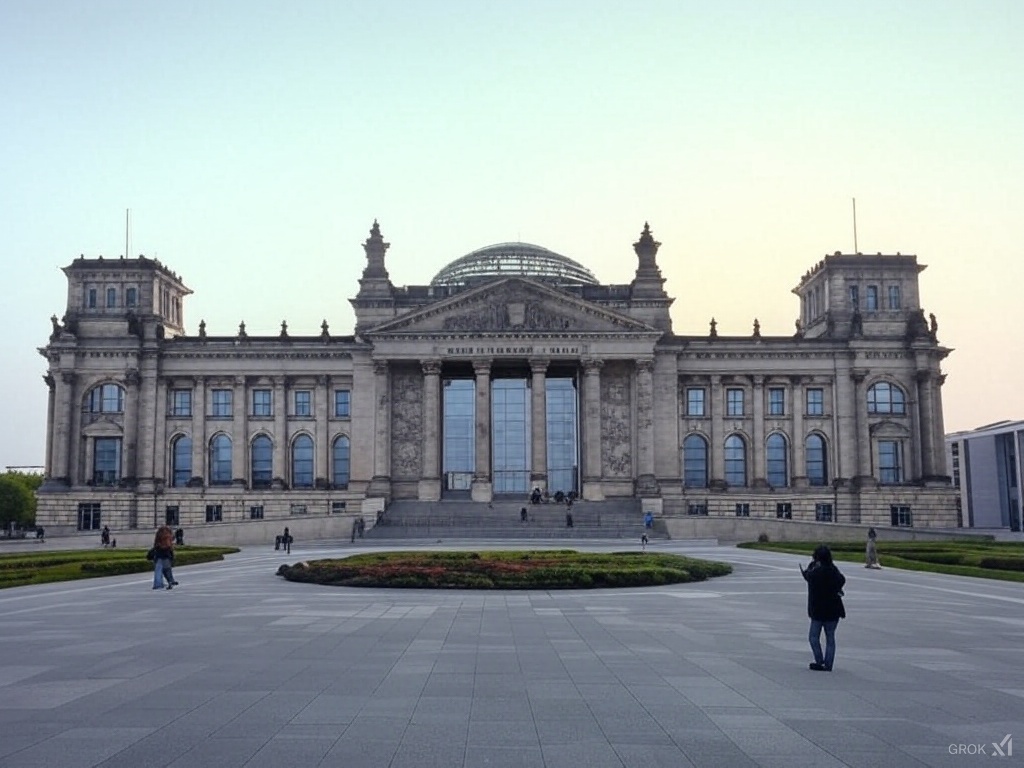Germany's Election Crossroads

20 February 2025
On February 23, 2025, Germany heads to the polls in a snap election that has captivated global attention. The far-right Alternative für Deutschland (AfD) stands poised to secure second place, riding a wave of anti-immigrant sentiment and bolstered by unexpected endorsements from U.S. figures like Elon Musk and Vice President JD Vance, threatening to unravel decades of political consensus.
While all eyes are on AfD's performance, the conservative Christian Democratic Union (CDU), led by Friedrich Merz, appears likely to claim victory, though forming a stable government amid a fractured political landscape remains a daunting challenge. The Social Democrats (SPD), under Chancellor Olaf Scholz, lag in third, grappling with a tarnished coalition legacy. This election, set against a backdrop of economic woes and European uncertainty, could redefine Germany’s postwar identity.
Meanwhile, AfD, once a fringe outfit of euroskeptic academics, has morphed into a populist juggernaut, channeling voter frustration over migration and security into a projected 20% of the national tally. That figure alone would mark a historic breach of Germany’s postwar taboo against far-right power, a taboo woven into its constitution after the horrors of the thirties. The party’s ascent, fueled by a campaign laser-focused on “remigration” and crime, has shifted the national conversation, pulling rivals into its orbit—sometimes uncomfortably so.
The CDU, under Merz, holds the pole position, polling above 30%. Its path to the chancellery seems clear, yet the road to governing proves less certain. Merz has spent months sharpening his rhetoric on immigration, a gambit that paid off when the Bundestag narrowly passed a CDU-sponsored motion to tighten borders—thanks to AfD votes. That decision shattered decades of consensus, eroding the so-called “firewall” separating mainstream parties from the far right. Critics argue Merz traded principle for pragmatism, handing the AfD a symbolic victory that emboldened its base. Supporters, however, see a leader adapting to a electorate weary of open-door policies, positioning the CDU as a bulwark against extremism while addressing real concerns—like the recent Aschaffenburg knife attack that left a toddler and a man dead.
Forming a coalition presents Merz with a puzzle missing a few key pieces. The Free Democrats (FDP), pro-business allies from past governments, hover near the 5% threshold needed for parliamentary seats, their libertarian streak clashing with Merz’s newfound hawkishness. The Greens, polling around 10%, offer a potential partner, though their climate-first agenda chafes against the CDU’s conservative instincts. A grand coalition with the SPD, a familiar if uninspiring option, looms as a fallback, potentially uniting two weakened giants to sideline the AfD. Each choice carries risks—alienating voters who crave change, or diluting the CDU’s mandate with compromises that feel like stasis.
The AfD, led by Alice Weidel, revels in its role as disruptor. High-profile nods from Musk and Vance have amplified its voice, framing the party as part of a global populist surge. Domestically, it thrives in the former communist east, where economic lag and distrust of Berlin fuel its narrative of exclusion. Western gains, particularly in industrial heartlands, signal a broader appeal. Yet, its isolation persists—every major party has vowed to shun it, leaving Weidel’s crew with influence, though no direct power. This cordon sanitaire, a hallmark of German politics, faces unprecedented strain. If the AfD’s vote share climbs higher, perhaps approaching 25%, coalition math grows trickier, tempting some to question the firewall’s durability.
Scholz and the SPD, meanwhile, fight a rearguard action. The collapse of their coalition with the Greens and FDP in November 2024 triggered this election, and their single-digit showings in eastern state polls reflect a punishing verdict. Scholz leans on Germany’s “good tradition” of rejecting extremism, urging voters to see the AfD as a threat to national unity. The pitch resonates with older, urban liberals, yet struggles to counter the visceral anger driving AfD support elsewhere. A late surge remains possible—mock elections among under-18s suggest a leftist revival, with the far-left Linke outpacing expectations—but the SPD’s ceiling appears low, likely relegating it to opposition or a junior partner role.
Violence and foreign meddling have cast long shadows over the campaign. Knife attacks, often linked to migrants, dominate headlines, amplifying AfD talking points. Musk’s vocal backing and Vance’s Munich meeting with Weidel sparked outrage, with Scholz decrying “jaw-dropping” interference. These incidents feed a narrative of a nation under siege, testing Germany’s resolve to balance openness with security. The economy, reeling from global headwinds, and the climate crisis, once a Green rallying cry, have faded into the background, ceding ground to identity-driven fears.
Resolution hinges on turnout and coalition talks. High participation could blunt the AfD’s edge, amplifying moderate voices. Post-election, Merz must navigate a tightrope—forge a government that reflects voter demands without legitimizing extremism. A CDU-Green-FDP trio, though ideologically messy, might stabilize the center, offering incremental reforms on migration and energy. Alternatively, a CDU-SPD pact could prioritize continuity, soothing jittery markets and EU allies. The AfD, barred from power, would amplify its opposition role, railing against an “elite lockout” as it eyes future gains.
Germany’s postwar identity—rooted in atonement and integration—faces a stress test. The election could solidify a rightward shift, with Merz steering a pragmatic course that echoes across Europe. Conversely, a fragmented result might paralyze Berlin, weakening its continental leadership as populism festers. That Bavarian ballot, cast amid snow-dusted fields, carries weight far beyond its borders, a quiet signal of whether Germany holds fast to its democratic moorings or drifts toward uncharted waters.
